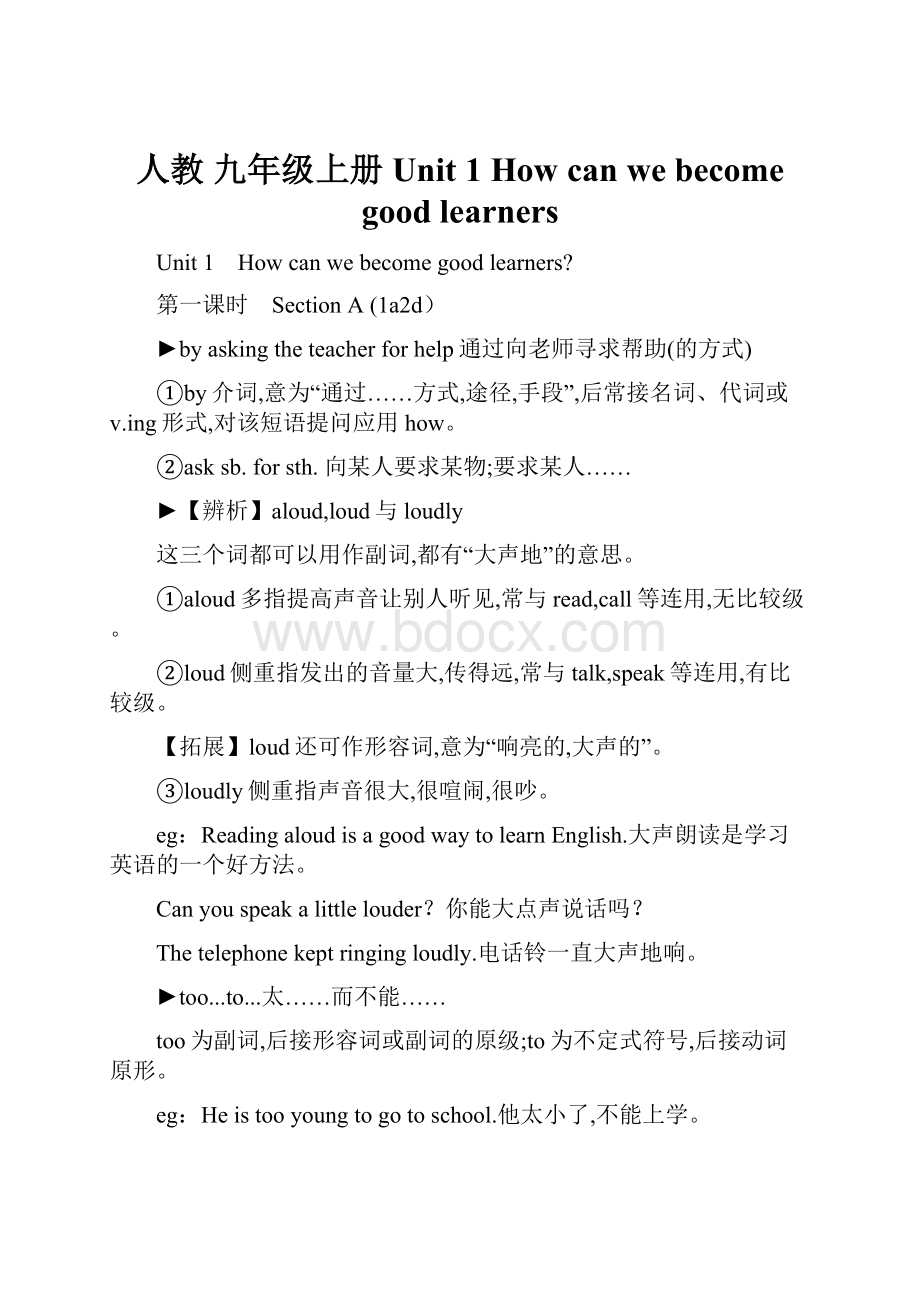 人教 九年级上册 Unit 1 How can we become good learners.docx
人教 九年级上册 Unit 1 How can we become good learners.docx
- 文档编号:25254272
- 上传时间:2023-06-06
- 格式:DOCX
- 页数:30
- 大小:54.64KB
人教 九年级上册 Unit 1 How can we become good learners.docx
《人教 九年级上册 Unit 1 How can we become good learners.docx》由会员分享,可在线阅读,更多相关《人教 九年级上册 Unit 1 How can we become good learners.docx(30页珍藏版)》请在冰豆网上搜索。

人教九年级上册Unit1Howcanwebecomegoodlearners
Unit1 Howcanwebecomegoodlearners?
第一课时 SectionA(1a 2d)
►byaskingtheteacherforhelp通过向老师寻求帮助(的方式)
①by介词,意为“通过……方式,途径,手段”,后常接名词、代词或v.ing形式,对该短语提问应用how。
②asksb.forsth.向某人要求某物;要求某人……
►【辨析】aloud,loud与loudly
这三个词都可以用作副词,都有“大声地”的意思。
①aloud多指提高声音让别人听见,常与read,call等连用,无比较级。
②loud侧重指发出的音量大,传得远,常与talk,speak等连用,有比较级。
【拓展】loud还可作形容词,意为“响亮的,大声的”。
③loudly侧重指声音很大,很喧闹,很吵。
eg:
ReadingaloudisagoodwaytolearnEnglish.大声朗读是学习英语的一个好方法。
Canyouspeakalittlelouder?
你能大点声说话吗?
Thetelephonekeptringingloudly.电话铃一直大声地响。
►too...to...太……而不能……
too为副词,后接形容词或副词的原级;to为不定式符号,后接动词原形。
eg:
Heistooyoungtogotoschool.他太小了,不能上学。
►patient形容词,意为“有耐心的”,常用于短语bepatientwith中,意为“对……有耐心”。
eg:
Youshouldbemorepatientwithyourchildren.你应当对你的孩子更有耐心。
【拓展】作名词,意为“病人”。
►重点词组归纳
the+比较级,the+比较级 越……,越……
studyforatest备考
spokenEnglish英语口语
giveareport作报告
atfirst起初
wordbyword逐词地;逐字逐句地
一、根据句意及汉语提示完成单词。
1.Lilyhadashort________(谈话)withherteacher.
2.DoctorSmithisquitebusynow.Youshouldbe________(有耐心的)andwaitforafewminutes.
3.Theteacheraskedmetoanswerthequestion________(大声地).
4.This________(句子)istoolongformetounderstand.
5.Ournew________(教科书)areontheteacher'sdesk.
二、用括号中所给单词的适当形式填空。
6.Justread________(quick)togetthemainideasatfirst.
7.TheirEnglish________(pronounce)isnotgood,butit'simproving.
8.Istudyforatestby________(work)withfriends.
9.Haveyouever________(study)withagroup?
10.Itwill________(probable)rain.Pleasetakearaincoatwithyou.
三、单项选择。
( )11.—HowdoyoulearnEnglish?
—________.(易错题)
A.Formakingwordcards B.Atschool
C.ByreadingEnglishstoriesD.Withmyclassmates
( )12.—Thedoctortoldmenottoeattoomuch,butIfinditdifficult.
—Thedoctorisright.________youeat,________youwillbe.
A.Theless;thehealthierB.Theless;themorehealthier
C.Themore;thehealthierD.Themore;themorehealthier
( )13.—Whatabout________arest?
—OK.Let'sgoforawalk.
A.totake B.take C.taking D.took
( )14.—WhynotwatchEnglishmoviestoimproveyourlisteningskills?
—It's________difficultforme________follow.(原创题)
A.too;toB.so;thatC.enough;toD.to;too
( )15.Whatdidyoulearn________readingsomanynovels?
A.withB.forC.byD.in
四、按要求完成句子,每空一词。
16.Whynotaskyourteacherforhelp?
(改为同义句)
________________askingyourteacherforhelp?
17.MarystudiesforanEnglishtestby_listening_to_tapes.(对画线部分提问)
________________Mary________foranEnglishtest?
18.Jennywassoexcitedthatshecouldn'tsayaword.(改为同义句)
Jennywas________excited________sayaword.
19.HaveyoueverwatchedEnglishmovies?
(作否定回答)
________,I________.
20.这个年轻人一字一句地向警察讲述了这起事故。
(翻译句子)
Theyoungmantoldthepolicemantheaccident________________________.
第二课时 SectionA(3a 3b)
►so...that...如此……以至于……
so是副词,后接形容词或副词,that引导结果状语从句。
【拓展】so...that...与such...that...的常用句型:
①so+形容词+a/an+可数名词单数+that从句
②such+a/an+形容词+可数名词单数+that从句
③such+形容词+复数名词/不可数名词+that从句
【注意】sothat意为“目的是,为的是,以便”,引导目的状语从句时,从句中通常含情态动词can,may,might等,可与inorderthat从句或inorderto结构相互转换。
►beafraidtodosth.“害怕做某事”,相当于beafraidofdoingsth.。
【拓展】①beafraidofsth./sb.害怕某物/某人
②beafraid+that从句 恐怕,担心(发生某种情况)
③I'mafraidso(=Yes)表示同意,意为“恐怕是这样”;I'mafraidnot(=No)表示不同意,意为“恐怕不……”。
►【辨析】discover与invent
①discover意为“发现;找到;发觉”,指发现本来已存在但以前未被发现的事物,或对发现者来说是新事物。
eg:
ColumbusdiscoveredAmericain1492.哥伦布于1492年发现了美洲。
②invent意为“发明”,指运用想象力创造出新的事物。
eg:
Doyouknowwhoinventedthefirstcomputer?
你知道是谁发明了第一台电脑吗?
►重点词组归纳
becauseof因为,由于
fallinlovewith爱上……
lookup查找
aswell也
一、根据句意及汉语提示完成单词。
1.Shegavehimapresentasan________(表达)ofthanks.
2.Tryto________(发现)what'sthebestwaytodoit.
3.Youareweakin________(语法).Youshouldlistencarefullytotheteacherinclass.
4.Daniel's________(梦想)istobeafamousdirectorinthefuture.
5.Couldyoutellmeyour________(秘诀)foralonghappylife?
二、根据句意,选择方框中的单词并用其适当形式填空。
call,pronunciation,afraid,work,understand
6.OurEnglishteachertoldmethiswordhastwo________,[peIl]and[pæl].
7.Haveyouwatchedthelatestmovie________TheMermaid(《美人鱼》)directedbyStephenChow(周星驰)?
(原创题)
8.Thegirlisalittleshy.Sheis________tospeakinpublic.
9.Icanhaveabetter________oflifeafterreadingthebook.
10.Youcanlearnmathwellby________withagroup.
三、单项选择。
( )11.LiNais________famous________allthetennisfansinChinaknowher.
A.too;to B.enough;to C.as;as D.so;that
( )12.Youdon'thaveto________everynewwordinthedictionarywhilereading.
A.lookforB.lookupC.lookatD.lookafter
( )13.Hehadtogohome________poorhealth.(易错题)
A.asaresultB.becauseC.soD.becauseof
( )14.OnFeb.11,2016theLaserInterferometerGravitationalWaveObservatory(激光干涉引力波天文台)intheUSsaidthatthey________agravitationalwave.(原创题)
A.discoveredB.inventedC.madeD.founded
( )15.—Roseisn'theretoday.Issheill?
—________.Isawheratthedoctor'sthismorning.
A.IhopesoB.Idon'tmindC.IamafraidsoD.Idon'tthinkso
四、根据汉语意思完成下列句子。
16.我发现写好这篇报告很难。
Ifound________difficult________________thereportwell.
17.我一到中国就立刻爱上了它。
AssoonasIgottoChina,I________________________________itatonce.
18.一开始我不太喜欢这份工作。
Ididn'tlikethejobverymuch________________.
19.—你能通过这次英语考试吗?
—小菜一碟。
—CanyoupasstheEnglishexam?
—________________________________________.
20.我通过听英文电影中的对话来提高英语。
IimprovemyEnglish________________________theconversationsinEnglishmovies.
第三课时 (GrammarFocus 4c)—单元同步语法精讲精练
►“by+v.ing形式”表示“以,靠,借助,通过,用(某种方法或手段)”达到某种目的或得到某种结果。
对此方式状语提问,应用how。
该结构常用于回答Howdoyou...?
或HowcanI...?
之类的问句。
eg:
—HowdoyoulearnEnglish?
你怎样学习英语?
—ByreadingEnglishnewspapersandmagazines.通过读英语报纸和杂志。
—HowcanIturnonthecomputer?
我怎样才能打开电脑?
—Bypressingthisbutton.通过按这个按钮。
【拓展】by的其他意思
①“by+交通工具/方式名词”意为“通过……,乘坐……”,表示交通方式。
如bytrain/taxi/bus/bike/boat/plane,by
land/road/sea/air等。
eg:
Hegoestoschoolbybuseveryday.他每天乘公交上学。
②“by+时间名词”意为“在……以前,不迟于……”,表示时间。
如bynow/then/nextFriday/twoo'clock等。
eg:
Youmustfinishyourhomeworkby5p.m.你必须在下午5点前完成你的家庭作业。
③“by+地点名词”意为“在……旁边,靠近……”,表示位置,此时可与beside换用。
如bythelake/river/window/door等。
eg:
Tom,comeinandsitbyme.汤姆,进来坐在我旁边。
④by还有“经过”的意思。
eg:
walk/pass/goby走过/经过/经过
⑤“by+反身代词”意为“独自,亲自”。
eg:
bymyself我独自,我自己
一、单项选择。
1.—________doyouknowsomuchabouttheUFO?
—IusuallygettheinformationbyusingtheInternet.
A.How B.What C.Which D.Where
2.ThetwokidspracticespokenEnglish________joiningtheEnglishclub.(易错题)
A.byB.inC.onD.with
3.Themanmakesalivingby________German.
A.teachB.toteachC.teachingD.teaches
4.—________doyouusuallygotoschool,Simon?
—Bybike.
A.WhenB.HowC.WhatD.Where
5.Hemustgo________ahotelifhegoeshome.(易错题)
A.toB.forC.byD.in
二、按要求完成下列句子,每空一词。
(原创题)
6.李强通过大声朗读来学习英语。
(翻译句子)
LiQianglearnsEnglish________________________.
7.杰克害怕独自一人待在家里。
(翻译句子)
Jackisafraidtostayathome________________.
8.沿河的树木都很高。
(翻译句子)
Thetrees________________________arealltall.
9.Helearnedsongsby_listening_to_tapes.(对画线部分提问)
________________he________songs?
10.Idogrammarexercisesevery_day.(对画线部分提问)
________youdogrammarexercises?
本课时其他知识点精讲精练
►repeat动词,意为“重复;重做”。
eg:
PleaserepeatwhatIsaid.请把我说的话再重复一遍。
►note作名词,意为“笔记;记录”,常用短语takenotes,意为“做笔记”;作动词意为“注意,指出”。
eg:
Pleasenotethatthemoviestartsat7o'clock.请注意,电影七点开映。
►keepadiary写日记
1.Myfavoritesubjectis________(物理).
2.Jackthinkshis________(化学)teacherisveryfunny.Sohelikeshimalot.
3.It'sveryimportanttotaken________inclass.
4.________(memorize)thewordsmayhelpyoustudyEnglish.
5.LiMing,youcanpracticelisteningbylisteningtoatapeandr________outloud.
第四课时 SectionB(1a 1e)
►pronounce动词,意为“发音”。
其名词形式为pronunciation,意为“发音;读音”。
►Idon'tknowhowtoincreasemyreadingspeed.我不知道如何提高我的阅读速度。
①howtoincrease...是“特殊疑问词+动词不定式”结构,用作宾语。
类似的特殊疑问词还有what,which,when,where等,其后都可以接动词不定式。
这类简单句往往是由主从句主语一致的复合句转化而来的。
eg:
Shedidn'tknowwhichdresstobuy.
=Shedidn'tknowwhichdresssheshouldbuy.她不知道该买哪条裙子。
②increase动词,意为“增加,增长”。
短语increaseto意为“增加到”,后接增长后的数字;increaseby意为“增加了”,后接增加的数量(含倍数/百分数)。
eg:
Thepricesofthevegetablesincreasedagain.蔬菜价格又上涨了。
③speed名词,意为“速度”,常用于结构ataspeedof中,意为“以……的速度”。
eg:
Heisdrivingatahighspeedof80kilometersperhour.他正以每小时80千米的速度驾驶。
►Idon'thaveapartnertopracticeEnglishwith.我没有一个可以一起练习英语的搭档。
该句中动词不定式短语topracticeEnglishwith作名词apartner的后置定语。
apartner又是介词with的逻辑宾语,构成介宾结构。
eg:
Ihavenopentowritewith.我没有可以用来写字的钢笔。
一、根据句意及汉语提示完成单词。
1.The________(速度)oflightisfasterthanthatofsound.
2.Maybeyoushould________(加入)anEnglishclub.
3.Thenumberofcarsis________(增加).
4.Idon'tknowhowto________(发音)thisword.Couldyouhelpme?
5.Your________(搭档)shouldpasstheballtoyouthen.
二、单项选择。
( )6.—Whatdoyouusuallydointhemorning?
(易错题)
—Ioftenpractice________English.
A.speak B.tospeak C.speaking D.spoke
( )7.Lisawassocarelessthatshemademanyspelling________inherhomework.
A.plansB.decisionsC.gradesD.mistakes
( )8.Thedininghallis________tohold300people.
A.enoughbigB.enoughwellC.smallenoughD.bigenough
( )9.Mybrotherdoesn'thaveapen________.
A.writingB.towriteC.towritewithD.writingwith
( )10.—Whichdresswouldyoulike,Madam?
(原创题)
—Sorry,Ican'tdecide________now.
A.tobuywhichoneB.buywhichone
C.whichonetobuyD.whichIshouldbuyit
三、从方框内选择适当的选项补全对话。
A:
Hi,Jim.Whereareyougoing?
B:
I'mgoingtomyEnglishteacher'soffice.
A:
Why?
B:
11.________
- 配套讲稿:
如PPT文件的首页显示word图标,表示该PPT已包含配套word讲稿。双击word图标可打开word文档。
- 特殊限制:
部分文档作品中含有的国旗、国徽等图片,仅作为作品整体效果示例展示,禁止商用。设计者仅对作品中独创性部分享有著作权。
- 关 键 词:
- 人教 九年级上册 Unit How can we become good learners 九年级 上册
 冰豆网所有资源均是用户自行上传分享,仅供网友学习交流,未经上传用户书面授权,请勿作他用。
冰豆网所有资源均是用户自行上传分享,仅供网友学习交流,未经上传用户书面授权,请勿作他用。
链接地址:https://www.bdocx.com/doc/25254272.html


 《初级会计实务》试题题库大全及答案详解.docx
《初级会计实务》试题题库大全及答案详解.docx
